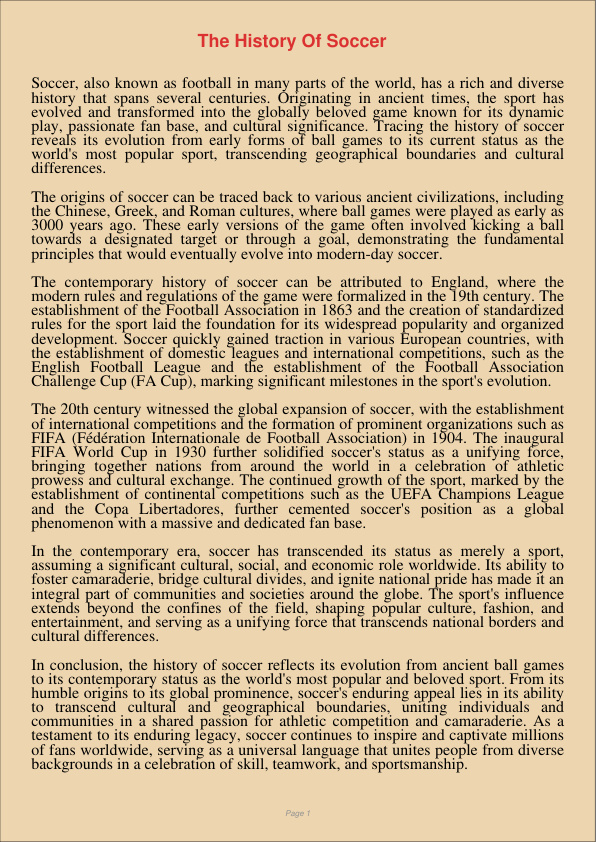The History Of Soccer
Jan 7, 2024
soccer
history
Religion and Theology
Visual Arts & Film Studies

Soccer, also known as football in many parts of the world, has a rich and diverse history that spans several centuries. Originating in ancient times, the sport has evolved and transformed into the globally beloved game known for its dynamic play, passionate fan base, and cultural significance. Tracing the history of soccer reveals its evolution from early forms of ball games to its current status as the world’s most popular sport, transcending geographical boundaries and cultural differences.
The origins of soccer can be traced back to various ancient civilizations, including the Chinese, Greek, and Roman cultures, where ball games were played as early as 3000 years ago. These early versions of the game often involved kicking a ball towards a designated target or through a goal, demonstrating the fundamental principles that would eventually evolve into modern-day soccer.
The contemporary history of soccer can be attributed to England, where the modern rules and regulations of the game were formalized in the 19th century. The establishment of the Football Association in 1863 and the creation of standardized rules for the sport laid the foundation for its widespread popularity and organized development. Soccer quickly gained traction in various European countries, with the establishment of domestic leagues and international competitions, such as the English Football League and the establishment of the Football Association Challenge Cup (FA Cup), marking significant milestones in the sport’s evolution.
The 20th century witnessed the global expansion of soccer, with the establishment of international competitions and the formation of prominent organizations such as FIFA (Fédération Internationale de Football Association) in 1904. The inaugural FIFA World Cup in 1930 further solidified soccer’s status as a unifying force, bringing together nations from around the world in a celebration of athletic prowess and cultural exchange. The continued growth of the sport, marked by the establishment of continental competitions such as the UEFA Champions League and the Copa Libertadores, further cemented soccer’s position as a global phenomenon with a massive and dedicated fan base.
In the contemporary era, soccer has transcended its status as merely a sport, assuming a significant cultural, social, and economic role worldwide. Its ability to foster camaraderie, bridge cultural divides, and ignite national pride has made it an integral part of communities and societies around the globe. The sport’s influence extends beyond the confines of the field, shaping popular culture, fashion, and entertainment, and serving as a unifying force that transcends national borders and cultural differences.
In conclusion, the history of soccer reflects its evolution from ancient ball games to its contemporary status as the world’s most popular and beloved sport. From its humble origins to its global prominence, soccer’s enduring appeal lies in its ability to transcend cultural and geographical boundaries, uniting individuals and communities in a shared passion for athletic competition and camaraderie. As a testament to its enduring legacy, soccer continues to inspire and captivate millions of fans worldwide, serving as a universal language that unites people from diverse backgrounds in a celebration of skill, teamwork, and sportsmanship.